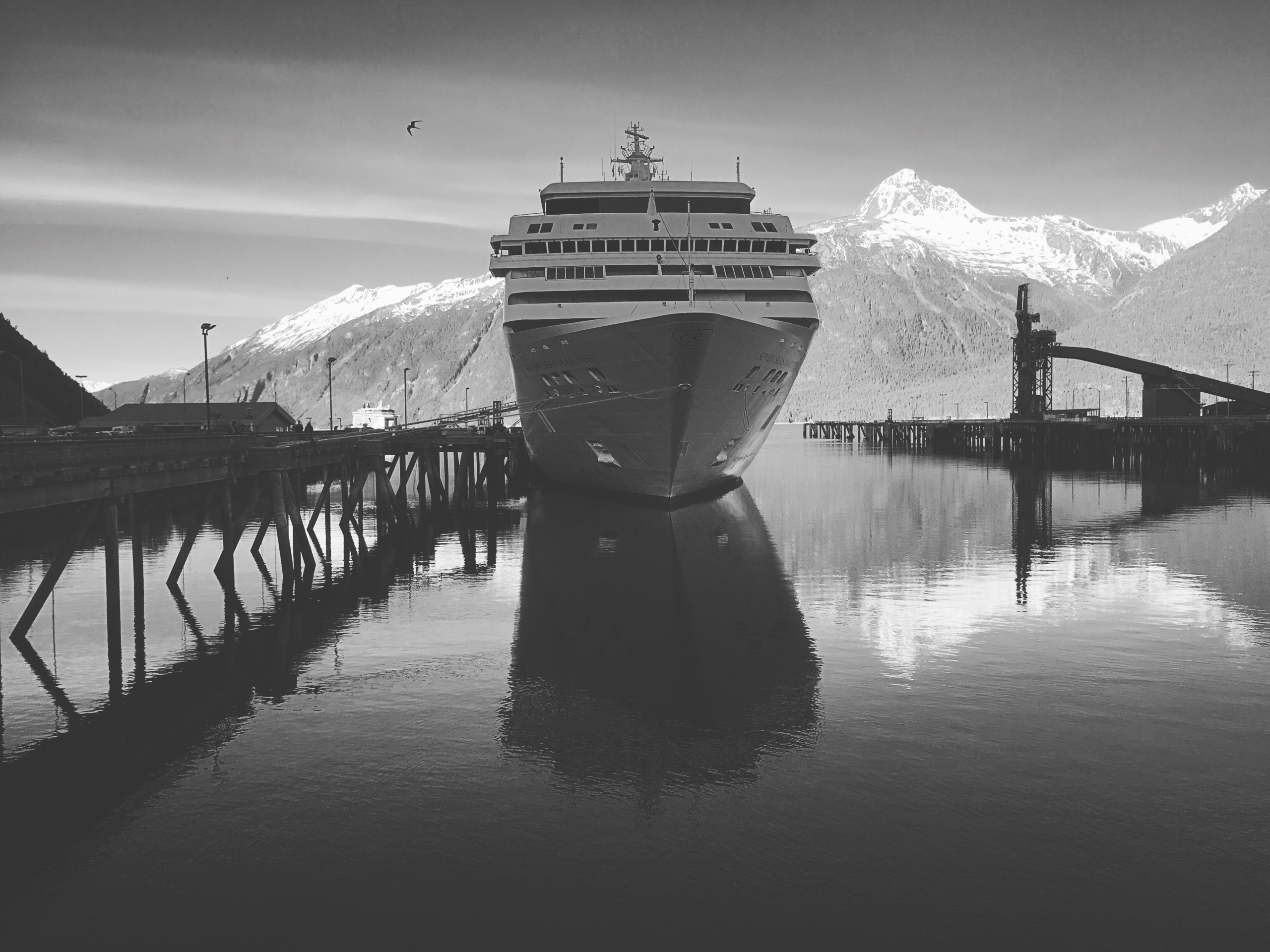In 2019, Larry Persily, owner of the Skagway News, announced that he would give away his local Alaskan publication to a person or a pair demonstrating journalistic skill, self-motivation, grit, and—above all—affectionate dedication to the quirks and quiddities of rural small-town reporting. National news outlets picked up the story as a sort of lark, emphasizing the remote and small-town nature of Skagway, the rarity of the giveaway, and then, in a few short lines, the challenges of sustaining critical local news coverage. In such stories, Persily was a Willy Wonka figure, courting a successor.
Among the applicants were Melinda Munson and Gretchen Wehmhoff, teachers in the Anchorage area who cowrote a blog for Alaskan families. Munson and Wehmhoff envisioned a dream job not unlike that conjured in headlines: the freedom to write and the promise of a place in a tight-knit community. Over the course of months, Munson and Wehmhoff had several intense phone interviews with Persily; for some, they met in a room in the school building with the lights off, to avoid drawing the attention of their principal.
When they learned they were among Persily’s top candidates, Munson and Wehmhoff drove eight hundred miles from Chugiak to Skagway to visit the place they hoped to call home. They were the only candidates to make such a trip; in January 2020, Persily offered them the paper.
Real estate is scarce in the town, so Munson and her family decided to rent temporarily until they could find more permanent accommodations; Munson’s husband, a chef, secured a job at the 123-year-old Skagway Brewing Company. Because of family obligations, Wehmhoff and her husband decided to stay in Chugiak until they could make a move to Skagway a reality, while Munson would handle the bulk of the on-the-ground reporting. “Gretchen planned to be around for the whole summer and to drive down as much as possible throughout the year,” Munson says. “Of course, it didn’t work out like that.”
In early March, Munson and Wehmhoff left Chugiak in two cars piled high with luggage and filled with five of Munson’s seven children. Traveling through a mountain pass near Skagway, they faced whiteout conditions; orange avalanche markers were the only visible signs marking the edges of the road. Not long after they arrived in Skagway, then-president Donald Trump declared the novel coronavirus pandemic a national emergency in the US, and Canadian prime minister Justin Trudeau announced the closure of the US-Canada border, blocking every major route out of Skagway that wasn’t via boat or airplane. The Municipality of Skagway declared its own state of emergency on March 16—an action Wehmhoff, in her new capacity, covered for the Skagway News.
Had they moved a week later, Munson believes, the new owners of the Skagway News may not have made it to their destination. Not long after they arrived, however, their new reality sank in.
“There was a day when I thought, Holy hell, do I get all my kids on a plane now?” Munson says. “My husband and I spent that one day planning our escape. Then we decided that we were just gonna stick it out with everybody else.”
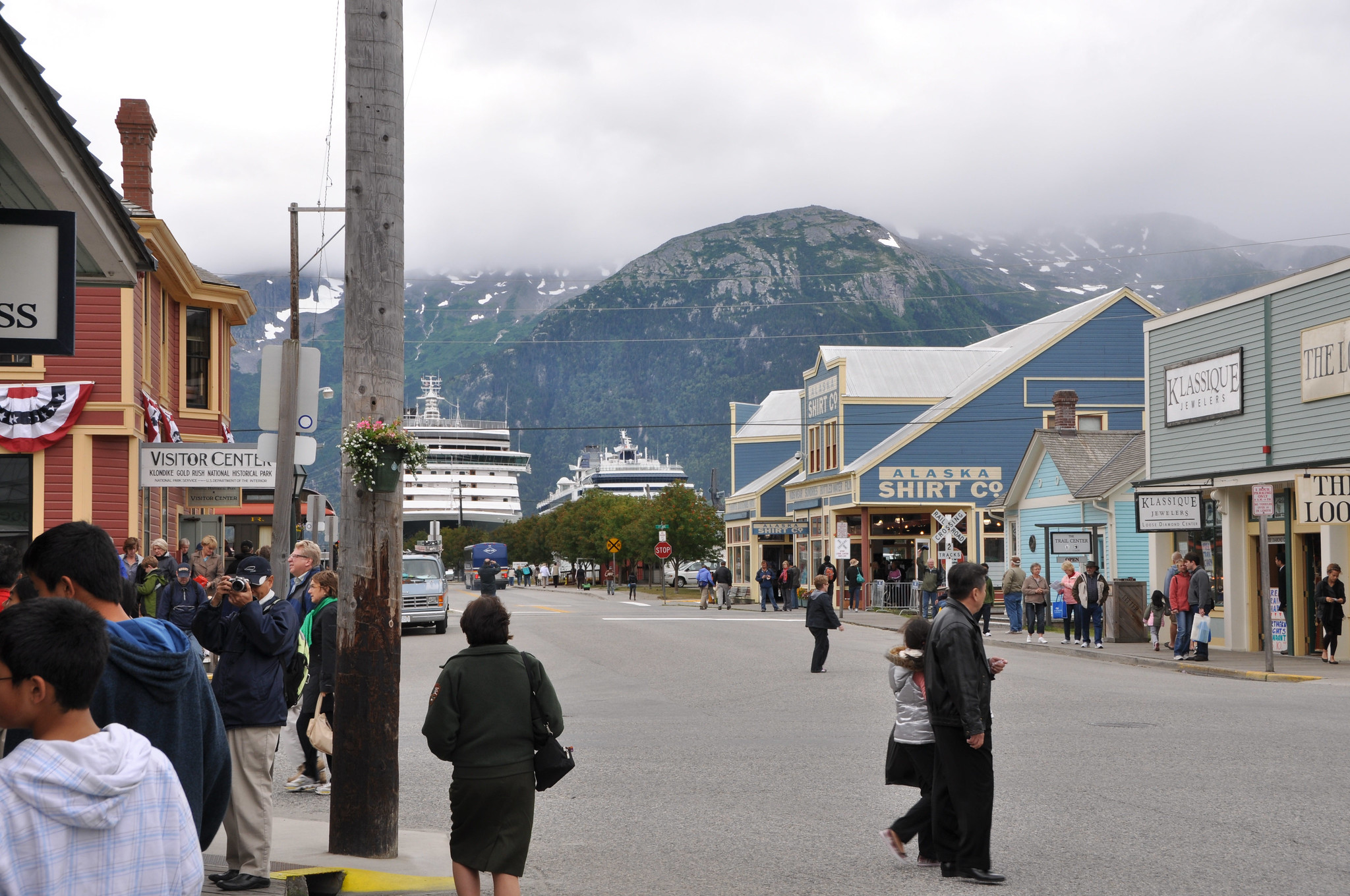
Skagway in 2010. Photo via Jeff Youngstrom/Flickr
SKAGWAY IS A BOROUGH on the inner crook of the coastal tendril that extends from mainland Alaska and separates Canada from the Gulf of Alaska. In 1897, sailors returning from Alaska piled off steamers in San Francisco and Seattle with Yukon gold and fables about its getting, and the ensuing Gold Rush to Skagway, which was incorporated a few years later.
Within a hundred years, cruise ships no longer needed the promise of material wealth to attract customers to the Northwest; today, stories are their capital. Skagway’s year-round population barely tops a thousand, while annual tourist traffic tops a million people, who in the summer months pour out of cruise ships and onto train cars that carry them into the mountains. Though local residents may tire of tourists asking them where they can find a moose—the answer is nowhere in Skagway—the economy depends on tourist season, and some local businesses operate at a loss for the remainder of the year. Each year, the Skagway News produces a summer publication for tourists called The Alaskan, which styles itself like an old newspaper from the Gold Rush era and highlights Skagway legends such as “Soapy” Smith, a con artist who was buried in the Skagway Gold Rush Cemetery. The advertising revenue from that publication makes up 80 percent of the paper’s budget: escapist fantasy funding substantive newsgathering.
The Skagway News is the only local paper exclusive to the borough. It’s a twice-monthly publication that was established amid the Gold Rush, closed soon after in the early 1900s, and then reestablished in 1978 by a young North Carolina transplant named Jeff Brady, who ran the paper for nearly forty years. In 2015, he turned over the business to a Canadian company, and ownership eventually made its way into the hands of Larry Persily, an old friend of Brady’s. Persily took over the paper’s management in 2019, working from Anchorage—a distance of nearly eight hundred miles from Skagway, which he quickly came to believe was too far.
“You gotta be part of the town,” Persily says. “You gotta go to the basketball games. You gotta be a trusted part of the community.” He discounted applicants who envisioned doing the job “for a couple years” or who wondered about how much they could contribute annually to an IRA. “Small-town papers need small-town editors,” he says. “I wanted an owner who was going to live there happily ever after.”
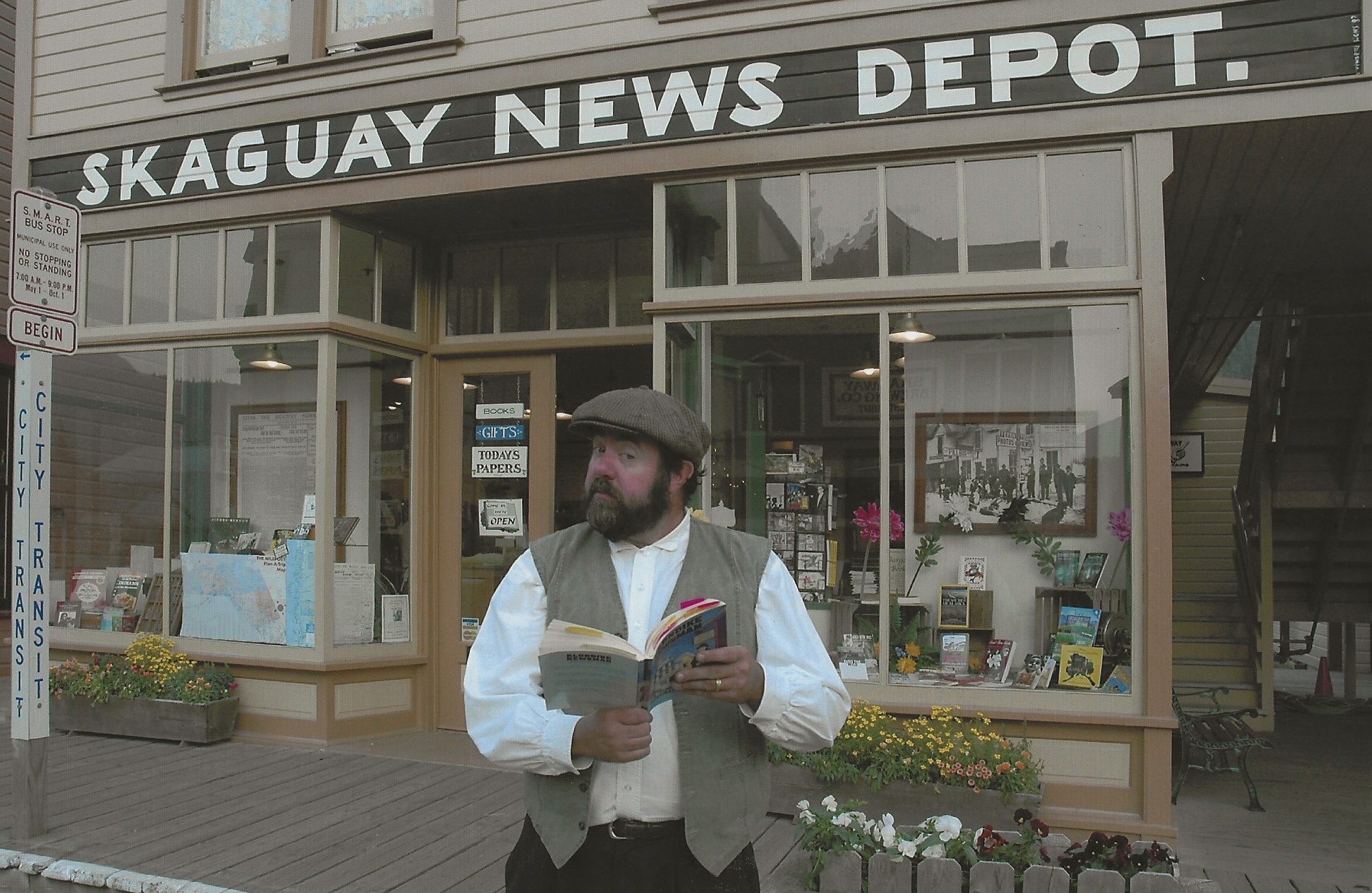
Jeff Brady, former Skagway News owner, in character as “Stroller” White, a Gold Rush–era journalist. Photo courtesy of subject.
Skagway residents are accustomed to their individual lives playing footnotes to the sweeping mythos of the Klondike mountains. The arrangement is clear in the motto: skagway, gateway to the klondike. For most who step foot there, the town is a place one goes in order to get somewhere else. But for one thousand people, Skagway is home, and a community whose information needs are as vital as any other’s—particularly during a global pandemic.
In a tourist economy, seclusion is often a death sentence. Brady, the newspaper’s former owner, runs a bookstore out of the building that also houses the newspaper. In a typical year, his store bustles with tourists browsing through novels and guidebooks in the summer months; throughout the past year, those books have sat gathering dust on the shelves. Brady says his total income from 2020 adds up to what he would have made in five days in a normal cruise ship season.
“We were supposed to have in excess of a million visitors to Skagway this year, and didn’t get any,” Jaime Bricker, director of public relations for the White Pass and Yukon Route scenic railroad, told me in December. “There’s a lot on the horizon: whether or not the cruise industry will return to Skagway, and whether or not passengers will be allowed to roam freely in our streets. It will decide survival for a lot of our small businesses.”
We can’t tell you what will happen in a year if the cruise ship industry doesn’t come back.
GRETCHEN WEHMHOFF AND MELINDA MUNSON make a winning pair. Wehmhoff is garrulous and lively; Munson is eloquent and tempered. Munson writes and edits, in addition to managing childcare and remote schooling for six kids; Wehmhoff does everything else. Each shows an obvious faith in the other’s capabilities.
“Gretchen is a Renaissance lady: she can do layout, ads, business,” Munson says. “When Gretchen writes, she spits it out on the paper, then hands it to me to edit.”
“I wipe up a little bit of the spit,” Wehmhoff responds.
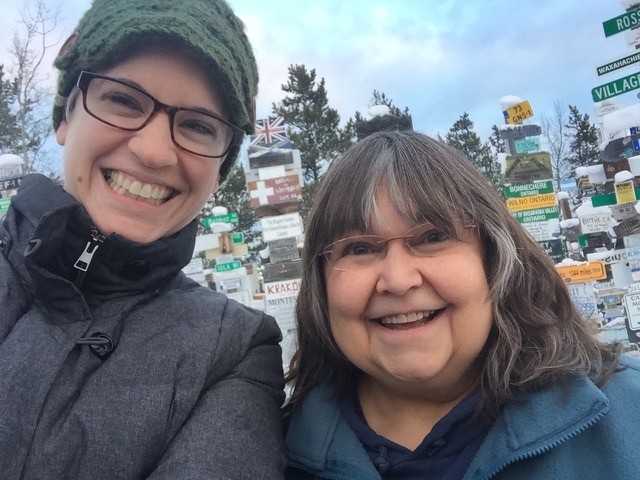
Munson (left) and Wehmhoff. Photo courtesy of subjects.
Wehmhoff and Munson are also extraordinarily optimistic—at once transparent about the significant challenge of sustaining a local newspaper amid a pandemic and confident in their abilities to navigate that challenge. “There’s something about this town and my family and myself that this is where we belong, right at this time, and this is what we’re supposed to be doing,” Munson says. “And I’m glad to have had that to hold on to when things got so hard.”
The fate of Skagway’s tourism industry has been a constant story for Munson and Wehmhoff—one that also shapes the fate of the Skagway News. In mid-July, Munson covered a vote by the Skagway Borough Assembly to turn away cruise ship business in 2020, for the safety of the town’s residents. In October, she covered the assembly as it weighed a new round of financial grants meant to help struggling local businesses survive the pandemic. Munson and Wehmhoff had advocated for their newspaper’s eligibility; at the meeting, a longtime local resident voiced her support for funding the paper.
When the pandemic began, Munson and Wehmhoff had quickly suspended subscription fees so struggling local residents could still access news coverage. They also stopped paying themselves. Revenue from The Alaskan vanished completely, and the paper had to return some funds to advertisers. The paper’s printing press, located in Canada, was cut off from Skagway when the border closed, so the women had to rapidly transform a print publication into a digital product. They revived a website redesign that Persily had begun. Because the paper had always been delivered in print copy, Munson and Wehmhoff didn’t have a list of subscriber email addresses. Using mailing addresses, Facebook messages, and a local phone book in its final year of publication, they began building electronic contact information for their subscriber base. When a few older residents expressed wistful interest in holding a print product between their fingers, Wehmhoff and Munson began running off copies on tabloid paper, delivering them to customers by request. They also pasted the newspaper’s pages inside the street-facing windows of their office building, where passersby could gather to read the paper from the sidewalk.
“We can’t tell you what will happen in a year if the cruise ship industry doesn’t come back,” Munson told me in November.
“I think if the town survives, the newspaper will survive. I think we’re so intertwined. It’s not going to be one without the other. Our fates are going to be the same.”
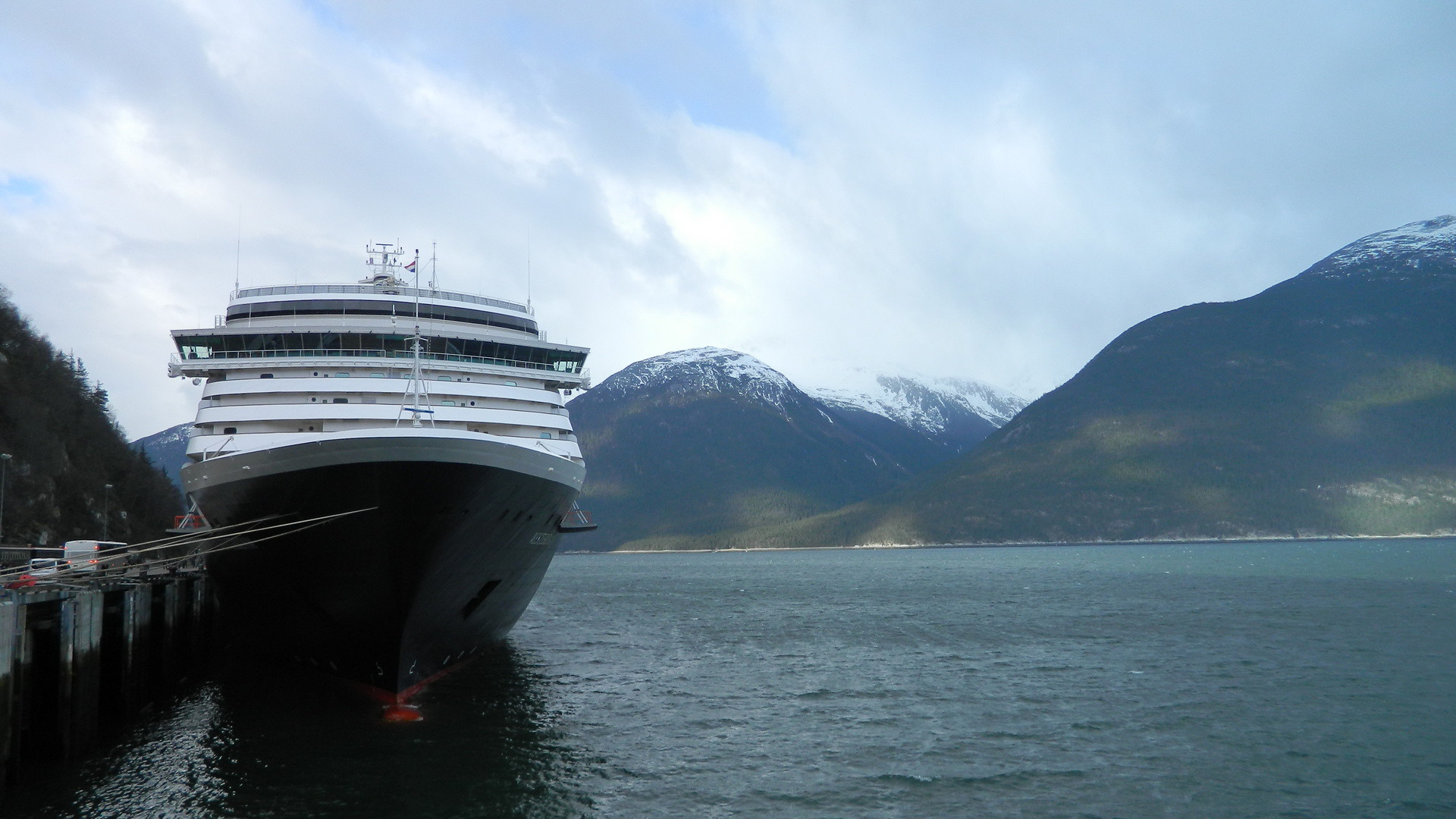
A cruise ship in Skagway in 2018. Photo via Allan Watt/Flickr
LOTS OF “SAVE LOCAL JOURNALISM” STORIES fail to interrogate what it is, precisely, that needs saving—or, for that matter, whether the existing structure meets the needs of the community it serves. Bricker, the PR director for the scenic railroad, is also president of the Skagway Traditional Council, a federally recognized local tribal government for Skagway Tlingit and Haida Indians, Alaska Natives, and American Indians. “In the past, there hasn’t been a very fluid connection between the municipality and the tribal government,” says Bricker, who adds that the Skagway News’s new owners have made efforts to report the gaps. In October, Munson reported on requests from the council for greater representation and inclusion in Skagway’s tourism industry as it is reshaped for pandemic times. “Gretchen and Melinda really discovered that there are many different groups and many different issues that need to be reported on,” Bricker says. Nearly a year into their time at the paper, Munson and Wehmhoff are still learning how they can best serve Skagway, even as they wonder whether they can survive long enough to figure that out.
It’s easy to celebrate Munson and Wehmhoff for their resilience and their optimism. Celebratory coverage, however, can obscure bleak realities. Their response to the curveball of the pandemic is at once inspiring and harrowing. They’ve worked overtime monitoring social media platforms popular among Skagway residents, countering rumors by corroborating information and steering readers back to their coverage. Both continue to teach remotely to supplement the modest income they’ve taken for their journalism work. They spend significant amounts of time crafting the paper; Munson’s children often accompany her to the newsroom.
Late last year, the Skagway assembly awarded the paper $10,000 in small-business grants from the municipality. Munson and Wehmhoff are using it to reestablish a print edition of the paper.
“Quitting isn’t something that just happens easily for either of us,” Wehmhoff told me in December. “I think that has been good for the community.”
“It’s a good thing for the community, but is it a good thing for you?” I asked.
“Exactly,” Munson said.
Recently, the Canadian federal government extended, for a year, its ban on cruise ships carrying more than a hundred passengers. News of the ban spread quickly on local Facebook groups like Skagway Bulletin Board, where it appeared with hashtags including #sos and #SaveOurSkagway. At that evening’s assembly meeting, the borough manager announced that the 2021 budget—which had already been adjusted to anticipate a quarter of the revenues made in 2019—would be readjusted to anticipate just 6 percent of pre-pandemic revenues.
“Can you imagine having to make that budget?” Munson told me when I followed up with her. “I’m laughing, but it isn’t funny.” She and her husband had arranged to buy a house in Skagway. “This definitely makes it harder,” she said of the purchase. “But we’re gonna do it. We’re here to stay. We’ve made a commitment.”
This post has been updated for clarity.
Lauren Boersma Harris is a freelance journalist. She writes CJR's weekly newsletter for the Journalism Crisis Project. Follow her on Twitter @LHarrisWrites.


